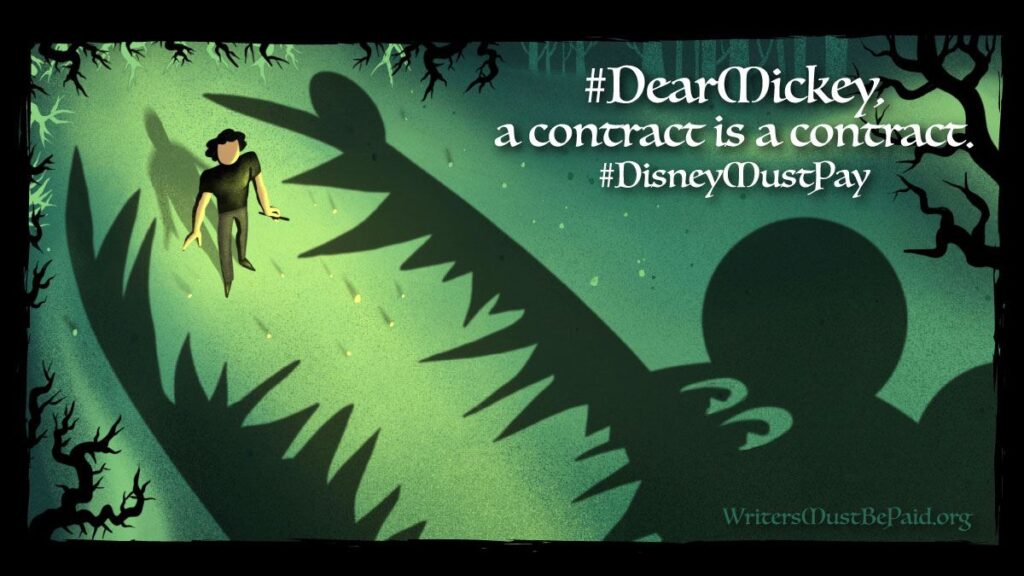Better cover the eyes of the children, because I’m about to write something bad about Disney.
Which is that they’re withholding payments from writers from spurious reasons. (Full disclosure: I may be one of these writers.)
Twenty or so years ago I wrote a Star Wars tie-in novel called Destiny’s Way. It was published in 2002. It’s the only tie-in novel I ever wrote.
It’s been available ever since. Hardback, paperback, ebook, dramatized audio book complete with stirring music and special sound effects. It’s been translated into half the languages on the planet.
I got a generous advance for the book, and the promise of a very small royalty if the book earned out its advance. Normally after twenty years in print, I’d assume a book had earned out and a royalty was due, but I never heard from the publisher, and no royalty statements were forthcoming.
Here’s what happened. Disney acquired LucasFilm in 2012, and after that the royalties just kind of disappeared. A few years ago Alan Dean Foster, author of numerous tie-ins who has a lot more at stake than I do, started to inquire where his monies were going, and was told that Disney had bought LucasFilm’s assets but none of its liabilities, and owed the author nothing.
It’s not just Star Wars tie-ins that are involved. When Disney bought Fox, which owns the rights to Buffy, Angel, Predator, Indiana Jones, and others, they transferred the comic book rights from Dark Horse (which is independent) to Boom! Comics, which is owned by Disney. Writers were told “royalties don’t transfer.”
Once word of this got out, writers’ organizations led by SFWA began to form a task force to find authors owed money and to press their case, using the hashtag #DisneyMustPay.
Or, as the President of SFWA, Mary Robinette Kowal, wrote: The larger problem has the potential to affect every writer. Disney’s argument is that they have purchased the rights but not the obligations of the contract. In other words, they believe they have the right to publish work, but are not obligated to pay the writer no matter what the contract says. If we let this stand, it could set precedent to fundamentally alter the way copyright and contracts operate in the United States. All a publisher would have to do to break a contract would be to sell it to a sibling company.
Because I haven’t received a royalty statement in many years, I don’t know whether Disney owes me money or not. Let me assure you that ignorance isn’t bliss.
Authors’ royalties are a teeny-tiny drop in the bucket for a company as massive and profitable as Disney. Paying what is owed won’t affect Disney’s bottom line in the slightest. Yet Disney has chosen, for reasons that are as opaque as the royalty situation, to tarnish their own good name in order to victimize working writers, who are the weakest element in the creative ecosystem.
It’s sad, it’s shabby, and it’s unworthy of a great entertainment corporation.
SFWA isn’t advocating a boycott of Disney, because most boycotts don’t work. (Though, for my own part, I won’t be enjoying The Mandalorian, WandaVision, or any other entertainment offered by Disney Plus anytime soon.)
What SFWA asks is to spread the #DisneyMustPay meme.
Spread away, my friends.

Thanks for sharing that this is affecting you. A small note that we got wrong on the initial communication – Stargate is not a Disney property, but remains an MGM one. Hopefully, keeping #DisneyMustPay pressure up will get all affected authors, including you, the statements and royalties you’re owed.
I’ll remove Stargate from my post. Thanks for the update and the encouragement!
Most contracts have a clause saying that the rights revert if the royalties aren’t paid. Wouldn’t that be the case here?
I own the words and the story, but Disney owns the characters. Even if I somehow got the book reverted, I couldn’t self-publish a work featuring Han Solo and Luke Skywalker.
The argument that Disney bought the assets but not the liabilities seems spurious at best. I would hope that it would be laughed out of court.
Anyway, royalties owed are obligations, not liabilities.
Clyde, you’re right that Disney’s argument is bogus. But they have a lot more lawyers than writers do.
Someone once commented that corporations, as entities whose sole priority is to generate as much profit as possible, exhibit all the classic symptoms of psychopaths. Toss this one on the pile as further evidence.
Comments on this entry are closed.